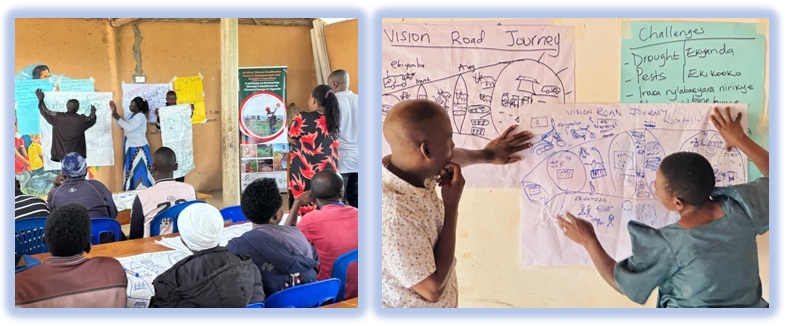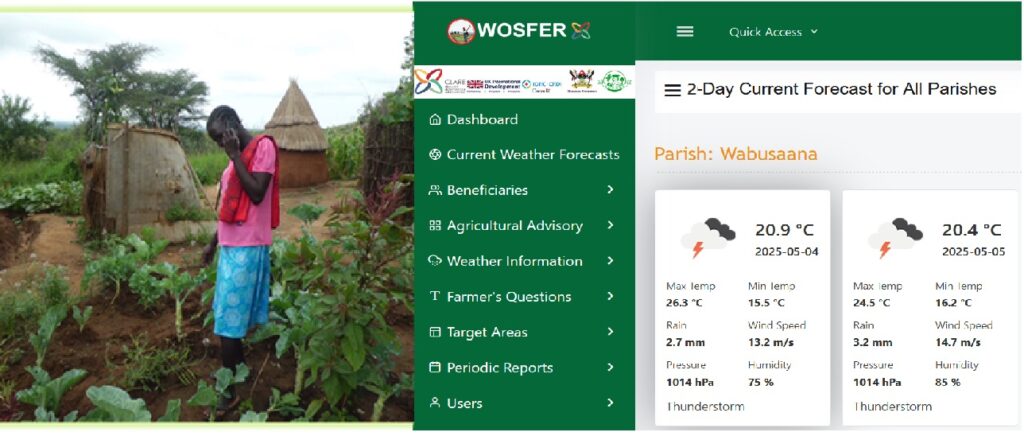WOSFER – Building WOmen Smallholder Farmers’ empowerment and adaptive capacities: A pathway to Enhancing women’s Resilience to climate change in Uganda
Summary: Rural women smallholder farmers face a myriad of gender-based constraints that raise their vulnerability to climate change shocks. This project will strengthen the empowerment and adaptive capacity of women smallholder farmers in the cattle corridor of Uganda (specifically, Katakwi and Lyantonde districts) using gender-transformative approaches, including training, mentorship and peer learning to promote the use of appropriate and sustainable climate-smart agronomic practices; timely weather information through women-friendly digital innovations; participatory community engagements targeting women, men, young people, and local, religious and cultural leaders; and the engagement of policy actors and practitioners in promoting gender-responsive policies. A special index measuring women’s empowerment in agriculture will be used to evaluate the interventions, and an additional module will capture changes in women’s resilience to shocks or stresses./sl
Context: Uganda is becoming hotter and drier, as average temperatures have increased by 1.3°C since the 1960s while average monthly rainfall is currently decreasing by approximately 6.0 mm with each passing decade. These changes are impacting the agricultural sector, particularly in drylands and “cattle corridor” areas that stretch across the country. Uganda’s agricultural systems are climate dependent, relying heavily on rain-fed agriculture and dominated by smallholder farmers, especially women. The need to protect the most vulnerable in Africa through strengthening resilience to climate change-related shocks for improved livelihoods and production systems is recognized by the African Union’s Malabo commitments. The Government of Uganda has been actively involved in global negotiations for addressing gender discrimination as well as those relating to climate change matters and increasingly encouraging the use of digital technologies and innovations to enhance the productivity and resilience of farmers, especially smallholder women farmers.
Project Objectives
Main Objective: To strengthen the empowerment and adaptive capacity of women smallholder farmers in the cattle corridor of Uganda using gender transformative approaches.
Specific Objectives:
The specific objectives of this project are;
- Advocate for policies and practices that enhance women smallholder farmers’ empowerment and adaptive capacities to climate change shocks.
- Establish women smallholder farmers’ levels of empowerment and adaptive capacities to the effects of climate change.
- Assess the social cultural gender norms, economic and political trade-offs and barriers to empowerment and climate adaptation by women smallholder farmers.
- Design and test a mix of gender transformative climate change adaptation innovations that are effective in enhancing women smallholder farmers’ empowerment and resilience to the effects of climate change.
Research Design and Approach
An experimental research design using a Randomized Control Trial (RCT) to test a mix of gender transformative interventions for inclusive climate adaptation and resilience;
- Training in gender responsive climate smart agronomic practices using the Gender Action Learning System (GALS), Mentorship & Peer Learning

2. Provision of timely Weather and Agricultural Advisories using a women friendly digital platform

3. Community Conversations

Expected Outcomes
- Collective learning and unlearning of the negative social and gender norms that block women’s empowerment, adaptation and resilience to climate change shocks
- Enhanced women smallholder farmers empowerment, adaptation and resilience to climate change shocks
Project Team Members

Lead Organizations
CLARE Partners
Contacts
flora.muhanguzi@gmail.com https://womenstudies.mak.ac.ug/
